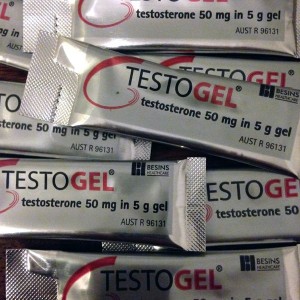PBS policy change on testosterone

This is a submission to the Health Minister, following a reported policy change by the Pharmaceutical Benefits Advisory Committee (PBAC) restricting access to testosterone to treatment initiated by a specialist.
Dear Minister
I write as president of Organisation Intersex International (OII) Australia Limited, an intersex-led Public Benevolent Institution run by volunteers that promotes the human rights and bodily autonomy of people born with intersex variations, or atypical sex anatomy. We also provide information, education and peer/family support services.
We are deeply concerned by changes from 1 April to the prescribing of testosterone. This policy change limits prescriptions to treatment initiated by a specialist, such as an endocrinologist. We are particularly concerned that the policy change does not address existing known issues of informed consent, access, or barriers to drug compliance.
Compliance issues
Testosterone is already subject to multiple forms of restriction: an “authority script” is necessary, import permits are required (including for Australian-prescribed medication on return to the country after an overseas trip), and prescriptions last for only 6 months rather than the typical 12 months. As a result of 2013 policy changes, there is now only a narrow window for repeat prescriptions before expiry of a previous script. State/Territory regulations also apply and, in NSW where I live, pharmacies are obliged to keep the prescription once presented.
These rules already combine to limit freedom of movement, and increase costs, and they also damage medical adherence and compliance. The new rules appear to indicate a failure of such existing measures to “curb the overuse of testosterone”. It is our view that the “authority script” mechanism provides ample and adequate opportunity to ensure appropriate use of the medication in connection with a specific medical condition.
Many members of OII Australia, myself included, have used testosterone since diagnosis with an intersex variation. Ceasing treatment can result in osteoporosis, depression and a range of other serious complications. Once commenced, testosterone treatment is required for life. However, with many years or decades of treatment, a 6-monthly review, by either a specialist or a generalist, is simply not necessary.
The new approach, of ensuring that a specialist “initiates” testosterone treatment has already caused concern to members of OII Australia, including members who have initiated testosterone treatment in previous decades and in other countries. It significantly increase compliance costs.
Access
Women who have Complete Androgen Insensitivity Syndrome are born with testes but their bodies metabolise testosterone differently to typical women or men. In Australia, such women (including members of OII Australia) have historically been subjected to non-necessary sterilisation due to an overstated risk of cancer, and perceptions that they are not really women if they have testes. This is documented in the 2013 Senate report on “Involuntary or coerced sterilisation”. Specialists now recognise that such sterilisations were not necessary, and women with Complete Androgen Insensitivity Syndrome who are not sterilised are able to undergo a normal female puberty. In such cases, their gonads produce testosterone and their bodies metabolise this in a way that suits their needs. This has been publicly confirmed by representatives of the Australasian Paediatric Endocrine Group.
Many women with Complete Androgen Insensitivity Syndrome are now discovering the benefits of testosterone treatment but they are unable to obtain testosterone on PBS at all because they are socially and legally recognised as women. Their inability to access testosterone on PBS has not been addressed by this policy change.
Informed consent
The Senate Community Affairs Committee report on “Involuntary or coerced sterilisation” found that medical interventions take place on people with intersex variations without our personal informed consent. These include surgical and hormonal interventions, often undertaken for social rationales such as parental distress, social stigma and even improved marriage opportunities.
The cross-party report made a number of recommendations about access to healthcare, and consent to medical procedures. We believe that this report, published in October 2013, warrants implementation to ensure that people with intersex variations are able to provide personal informed consent to medical procedures – including testosterone and other hormone treatments. The current policy change does not implement those recommendations.
We would welcome the opportunity to discuss these issues with you, and/or changes to current policy frameworks to ensure personal informed consent, improved access, and improved drug compliance.
Thank you very much for your consideration of these concerns.
Kind regards
Morgan Carpenter
President, Organisation Intersex International Australia Limited
PO Box 46, Newtown, NSW 2042
More information
- Kate Aubusson at Australian Doctor (24 February 2015) PBS to restrict GP testosterone prescribing
- Morgan Carpenter and Tony Briffa at OII Australia (29 October 2013) Statement on the Senate report ‘Involuntary or coerced sterilisation of intersex people in Australia’
- Morgan Carpenter at OII Australia (20 August 2009) Testosterone: suffering the system, not the medication
- Universitätsklinikum Schleswig-Holstein (23 December 2014) Seit November 2011 nehmen Frauen mit kompletter Androgenresistenz an der CAIS-Studie teil. Sie untersucht den Einfluss verschiedener Hormontherapien auf die Lebensqualität
You must be logged in to post a comment.